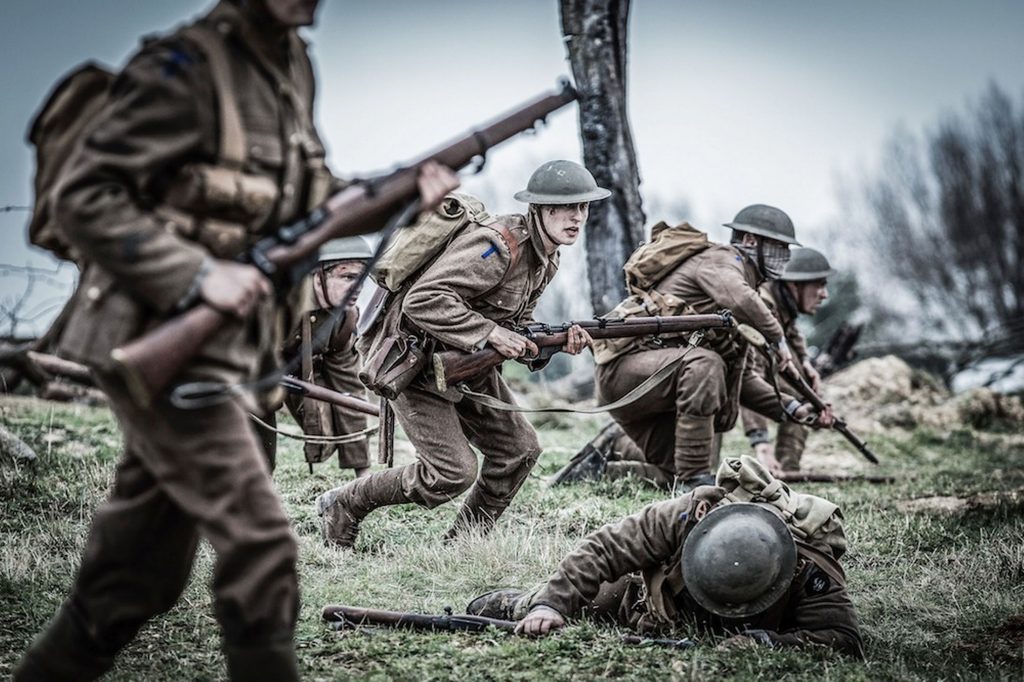Jason recommends: “Our World War”
 I want to tip you off to something really good I came across while digging through Netflix’s catalog the other day. It’s a 3-episode miniseries called Our World War, produced last year by BBC Three as part of the Beeb’s ongoing commemoration of the 100-year anniversary of the First World War.
I want to tip you off to something really good I came across while digging through Netflix’s catalog the other day. It’s a 3-episode miniseries called Our World War, produced last year by BBC Three as part of the Beeb’s ongoing commemoration of the 100-year anniversary of the First World War.
Our World War isn’t an attempt to tell the whole story of that war. Instead, taking memoirs and letters home written by men who actually fought in it as its source material, it tells three intimate, tightly-focused stories of the war as several British soldiers experienced it. Episode one, “The First Day,” follows young Lieutenant Maurice Dease as he and his small unit of Royal Fusiliers struggle desperately to prevent the German army from crossing a strategic bridge at Mons in August 1914. The second episode, “Pals,” follows Paddy Kennedy, a Manchester clerk who joins the army with his fellow office clerks in a flush of patriotic enthusiasm only to all be thrown together in 1916 into the charnel house that was the first day on the Somme. And in the final episode, “War Machine,” Private Charles Rowland joins the fledgling Tank Corps in 1918 just in time to participate in the Battle of Amiens, in which tanks and airplanes realized for the first time their potential to break the trench stalemate of the Western Front.
The first thing to like about Our World War is that tight focus. By keeping its gaze firmly upon just one leading character and a handful of supporting characters, it gives you some sense of what it must have felt like to be a tiny cog in any of the modern world’s huge military machines. The men it depicts don’t have any meaningful control over the colossal events thundering around them; they just try to follow their orders as best they can and not get themselves killed in the process.
The show is also interesting in how it will broaden your understanding of how World War I was actually fought. Now that it’s almost entirely beyond living memory, the image of that war that lingers in our perception is the hopeless, static struggle in the trenches. Our World War steps beyond that by taking you to moments on the Western Front that belie the stereotype. Mons, fought before the trenches were dug, comes across as a desperate stand in the 19th-century tradition of Little Bighorn and Rorke’s Drift, as a small band of riflemen with barely any cover to hide behind try to hang on against overwhelming numbers. At the Somme, the show takes us not with the many units that were mowed down by machine-gun fire, but with one of the very few that actually managed to break through the German lines — only to find themselves locked in a swirling, seemingly endless fight for survival in a grim, fog-shrouded wood. And when we climb aboard the Niveleur, the primitive tank that carries Chas Rowland into battle at Amiens, we find a close-packed, claustrophobic world in which eight men have to work together without being overcome by sweltering heat or poorly ventilated engine fumes to make their steel beast come to life.
Surprisingly, the reviews I could find online from the original airing of Our World War in Britain were mixed at best, with lots of complaints about one particular element: the filmmakers’ stylistic decision to make their presentation deliberately modern, eschewing a sepia-toned, wax-cylinder aesthetic in favor of contemporary music on the soundtrack and abrupt, quick-cut editing. It’s a decision that rubbed some reviewers distinctly the wrong way. Personally, however, I think it was brilliant; it takes these stories out of the black-and-white realm of memory and makes them involving to a modern viewer in a way that old newsreel footage could not. Some reviewers did understand this, but most appear to have not, with the result that Our World War has been buried deep in the bowels of Netflix instead of getting the attention on this side of the pond it really deserves.
My hope is that writing this can help change that, at least a little bit. Our World War is thrilling, engaging and profoundly moving. It brings World War I to life in a way that no other production I’ve seen ever has. So if you’re a Netflix subscriber, do yourself a favor and check it out.
